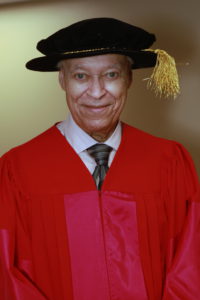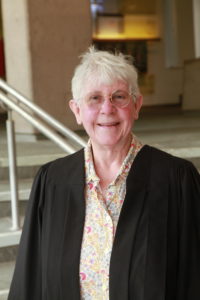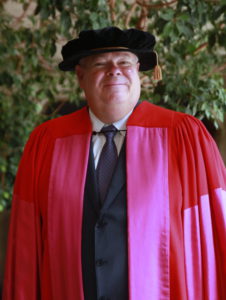Gordon S. Earle
 Domina Cancellaria; praesento vobis Gordianum S. Earle, ut admittatur ad gradum Doctoris in Jure Civili (honoris causa).
Domina Cancellaria; praesento vobis Gordianum S. Earle, ut admittatur ad gradum Doctoris in Jure Civili (honoris causa).
Though Gordon Earle’s life story has been punctuated by firsts, his achievements in a long career in human rights, public administration, and politics should not be calculated primarily in terms of ordinal pre-eminence. Nevertheless, because he shares one of his earliest firsts with King’s, it is fitting on this occasion to recall that in 1959, Mr. Earle became the first recipient of the College’s Prince Scholarship for African Nova Scotians. In 2018, soon after the Scholarship was restored, Mr. Earle recounted that had it not been for the Prince he may not have been able to attend university at all: soon after he learned of the award, his father, a CN Rail Porter and the family’s sole bread winner, died suddenly. As for so many King’s graduates over the centuries, Mr. Earle went on from King’s to contribute much to communities beyond the quad as a trailblazer in local, provincial and national spheres.
Mr. Earle began his career in public service working closely with Dr. H.D. Smith, a former King’s President and Nova Scotia’s first Ombudsman, to establish that office and expand its compass. For 10 years, he was Nova Scotia’s Chief Human Rights Officer and Assistant Ombudsman. A hallmark of those years was work in drafting the Nova Scotia Human Rights Act. He then took his expertise to the province of Manitoba, serving as Ombudsman for 12 years there, before returning to Nova Scotia to become Deputy Minister of Housing and Community affairs. He was the first person of African descent to occupy any of these roles. After retiring from the public service, Mr. Earle entered politics as a successful candidate for the New Democratic Party in the riding of Halifax West in the federal election of 1997, becoming the first African Nova Scotian to sit in the House of Commons. He remained active in politics for the next decade, contesting elections in 2000, 2004, 2006, 2008 and 2011. In the realm of public advocacy, Mr. Earle spoke out in favour of a provincial inquiry into abuse at the Nova Scotia Home for Coloured Children, and he was one of the first to call upon the Federal Government to apologize for the racist treatment of No. 2 Construction Battalion members during and following their service in the First World War. Since taking his initial degree at King’s, Mr. Earle has been a loyal, active and dedicated alumnus. In 1999, he was awarded the Judge J. Elliot Hudson Award by the King’s Alumni Association.
The Shotokan philosophy of Karate, in which Mr. Earle holds a black belt, emphasises humility, respect, compassion, and patience, as well as promoting inward and outward calmness. Its practitioners thus cultivate both discernment for mediation and the resolve to fight persistently when necessary. That same philosophy states that the aim of Karate lies not in victory or defeat, but in the perfection of character. Madame Chancellor, in the arts of public service and governmental accountability, Gordon Earle has demonstrated perfection of personal character through dedication to community. For his leadership and example in a long career of firsts, I ask you to bestow on Gordon Sinclair Earle his first honorary degree: the Doctor of Civil Laws (honoris causa). Read Gordon Earle’s Convocation Address.
Janet Hathaway
 Domina Cancellaria, te orant obsecrantque professores doctissimi Universitatis nostrae ut Johannina Hathaway ad munus officiaque sociorum (honoris causa) venerabilis Collegii Regalis admittatur.
Domina Cancellaria, te orant obsecrantque professores doctissimi Universitatis nostrae ut Johannina Hathaway ad munus officiaque sociorum (honoris causa) venerabilis Collegii Regalis admittatur.
The ancient Greeks and Romans held the Titan goddess Mnemosyne in high esteem. As veterans of the Foundation Year Program know, both Homer and Virgil called upon the Mother of the Muses, Memory personified, to inspire and inform their immortal words. Though it is not widely recognized, universities still maintain highly frequented shrines to Mnemosyne. The one at King’s is particularly prominent and well-loved. For what is our Library but a palace of Memory, its shelves teeming with the minds of the collective past? Its books inspire and inform scholars at all stages. Not a few of them will repay the boon by adding their own volumes to its stacks. Its Archives too, lying literally at the foundations of our College, are a resource and responsibility that do far more than record done deeds. As accessible memory, they sustain its mission today and help us navigate the future.
In her 27 years of employment at King’s, Janet Hathaway assiduously curated and protected our Memory Palace. Through a series of appointments leading to that of Assistant Librarian for Archives, Janet made our records recoverable, matching hours of subterranean labour in cataloguing and organization with the production of multiple fonds and finding aids. She was instrumental in preparations for King’s 225th anniversary in 2014, creating a major exhibition of the University’s history for community and public edification. Those were laurels enough to rest upon, and indeed, Janet formally retired the next year, only to be drawn back to the archives to work part time in the realm that she knew and loved like no one else. At her return she also adopted the apt role of anamnesis, taking minutes for meetings of the Board of Governors with a degree of detail, accuracy and clarity that will make generations of her archivist successors thrill. The culmination of her expert service to King’s, however, began in 2018. In a moment of need for the College, Janet agreed to leave retirement and become Interim University Librarian and Archivist, a role she graciously filled for three years.
In addition to her degrees in Fine Arts, Library Studies, and Law, Janet Hathaway also holds a Bachelor of Journalism from King’s that predates her employment here. It is a telling detail of her collegiate history, since through her career she kept the needs and interests of Kings students clearly in view, whether by serving as subject specialist, Academic Integrity Officer, minute-taker for the Sexualized Violence Policy Committee, or by creating dozens of work opportunities for them while sharing her generous mentorship.
Madame Chancellor, for her lifelong contributions to King’s as an architect of memory in our building of books, I ask you to admit Janet Hathaway as a Fellow of the College (honoris causa).
John K.F. Irving
 Domina Cancellaria; praesento vobis Johannem K.F. Irving, ut admittatur ad gradum Doctoris in Jure Civili (honoris causa).
Domina Cancellaria; praesento vobis Johannem K.F. Irving, ut admittatur ad gradum Doctoris in Jure Civili (honoris causa).
In 458 BCE, the Greek tragedian Aeschylus described a wonderful invention for telegraphing information between continents in less than a day. His most famous play opens with a weary watchman on a rooftop in the Peloponnesian city of Argos. The watchman eagerly anticipates daybreak, but instead catches sight of a beacon fire, last in a long coastal series from another city, across the Aegean Sea in present day Turkey. That city, Troy, had just succumbed to a Greek army after 11 years of siege. By ingenious human artifice, life-changing news was transmitted, and a dissipated community brought together again—for good and ill. Though the rest of the play could be read as a cautionary tale of miscommunication and misinterpretation, its narrative surely stands as one of the first to highlight both the power of technological information sharing and the heavy responsibility of those who channel and receive it: admirable early reading for all Foundation Year Program students, and not least its Journalism cohort.
As President of Ocean Capital Investments Limited, John Irving knows this responsibility and nurtures it. In addition to holdings in construction and building materials, Ocean Capital owns Acadia Broadcasting, a company that includes 15 FM radio stations in Ontario, his native New Brunswick, and in Nova Scotia. Acadia’s history stretches back to 1928, when the transmitters of radio station CFBO first towered over forests and must have seemed as uncanny as Aeschylus’ beacon fires. Acadia Broadcasting has specialized in providing a local community voice for news, entertainment, and event dissemination. Its newsrooms have hosted King’s journalism interns and provided careers for graduates, and the company funds a scholarship in its name for a BJ student interested in broadcasting. Mr. Irving has shown his personal appreciation and concern for King’s, and especially its Journalism programs, in other ways as well. It is a distinction King’s shares with his alma mater, Harvard University. Indeed, his concern for, and support of the interests of higher education, culture, and community are evident in a long list of voluntary contributions he has made while in leadership positions in the businesses of his well-known family. He is Honorary Colonel of the storied 3rd Artillery Regiment of St. John, known as the “Loyal Company,” and has been instrumental in restoring and refurbishing its material, built, and narrative history in the city. His honours include the Canadian military Meritorious Service Medal, the YMCA Red Triangle Award, the Queen’s Diamond Jubilee medal, and Harvard’s Hiram Hunn award.
Madam Chancellor, should King’s not crown this list with its own highest honour? For his contributions to community and education, and especially to local journalism and journalism education, I ask you, in the name of King’s College, to bestow upon John K.F. Irving the degree of Doctor of Civil Laws (honoris causa).